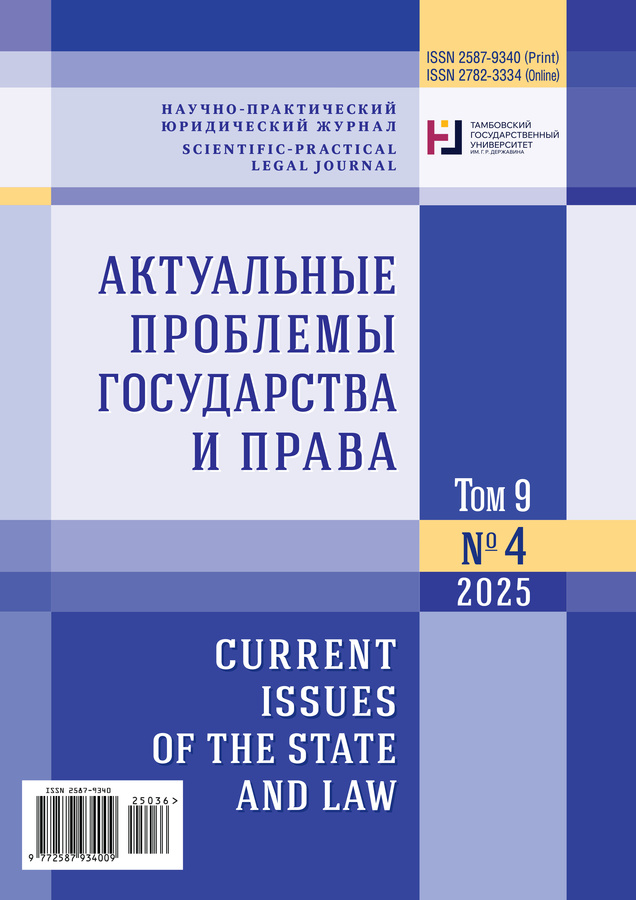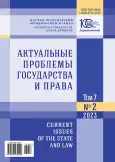Аксиологический статус государственно-правовой доктрины русского консерватизма
- Авторы: КУЗУБОВА А.Ю.1
-
Учреждения:
- ФГБОУ ВО «Воронежский государственный педагогический университет»
- Выпуск: Том 7, № 2 (2023)
- Страницы: 198-204
- Раздел: Общая теория и история права и государства
- URL: https://journal-vniispk.ru/2587-9340/article/view/303461
- ID: 303461
Цитировать
Аннотация
Рассмотрены особенности аксиологического статуса государственно-правовой доктрины русского консерватизма, оказывающие воздействие на национальные алгоритмы ценностно-мотивированной организации правовой деятельности. Обосновано, что консервативная доктрина представляет собой взаимосвязь иррациональных правовых образов и рациональных идей, восходящих из религиозных установлений и государственно-правовых традиций общества, опирающихся на концепты приоритета этических начал над формально-юридическими основаниями. Доказано, что российское правовое мышление существенно отличается от западного, что наиболее полно воплощено в модусе отечественного консерватизма с присущей ему теономной этикой и метафизикой всеединства. На основе анализа отечественной правовой традиции сформулировано определение консервативных правовых ценностей как обусловленных культурно-цивилизационным своеобразием представлений о правовой реальности, выраженных в правовом сознании и правовой культуре, воспринимаемых в единстве с нравственными ценностями. Целью исследования является установление аксиологического статуса государственно-правовой доктрины русского консерватизма. Методологическая основа включает в себя использование специально юридических методов: исторического, формально-логического, сравнительного, в то же время историко-юридический характер работы обусловил необходимость привлечения теоретико-правовой интерпретации и оценки государственно-правовых идей, структурного и компаративного методов. Констатировано, что аксиологический потенциал государственно-правовой доктрины русского консерватизма заключается в сближении модусов морали и права, ориентации на обеспечение правопорядка при конгруэнтном взаимодействии правовых и нравственных регуляторов. Утверждается, что в рамках аксиологического подхода и в контексте учета правовой традиции России возможно как преодоление инертности современной теории права, так и повышение эффективности правового регулирования.
Об авторах
Ангелина Юрьевна КУЗУБОВА
ФГБОУ ВО «Воронежский государственный педагогический университет»
Автор, ответственный за переписку.
Email: angelinakuzubova@mail.ru
ORCID iD: 0000-0002-6903-1628
кандидат юридических наук, доцент, доцент кафедры философии, экономики и социально-гуманитарных дисциплин
Россия, Российская Федерация, 394043, г. Воронеж, ул. Ленина, 86Список литературы
- Философия права. Курс лекций: в 2 т. / отв. ред. М.Н. Марченко. М.: Проспект Москва, 2011. Т. 1. 552 с. URL: https://djvu.online/file/JIJpqGxGIxHlD
- Ананьев Н.А. Основные идеи русского консерватизма в конце XIX – начале XX века // Социально-гуманитарные знания. 2021. № 4. С. 341-347. https://doi.org/10.34823/SGZ.2021.4.51662, https://elibrary.ru/hljvqr
- Гусарова М.А. Проблема кризиса правосознания в философии русского консерватизма XIX – начала XX в. // Исторические, философские, политические и юридические науки, культурология и искусствоведение. Вопросы теории и практики. 2017. № 3-2 (77). С. 57-60. https://elibrary.ru/ygsuab
- Демин И.В. Категория «служение» в контексте русской консервативной философско-политической мысли // Конфликт идеологий: философские, социально-политические и культурно-исторические аспекты: сб. материалов Всерос. науч. конф. с междунар. участием / отв. ред. И.В. Демин. Самара, 2022. С. 12-19. https://elibrary.ru/nnsfwl
- Кузнецова Н.Н., Чердаков О.И. Деструктивное выражение отношения к российскому самодержавию в политико-правовых учениях второй половины XIX века // История государства и права. 2018. № 1. С. 61-69. https://doi.org/10.18572/1812-3805-2018-1-61-69, https://elibrary.ru/ynibkj
- Иеринг Р. Избранные труды: в 2 т. СПб.: Юрид. центр Пресс, 2006. Т. 2. 547 с. URL: https://search.rsl.ru/ru/record/01003032586
- Сорокин В.В. Право и православие. Барнаул: Изд-во Алтай. ун-та, 2007. 547 с. URL: http://www.posoh.ru/book/doc/sorokin_v_v_pravo_i_pravoslavie%20-%202007.pdf
- Карцов А.С. Правовая идеология русского консерватизма (II половина XIX – начало XX в.): дис. … д-ра юрид. наук. М., 2008. 587 с. URL: https://search.rsl.ru/ru/record/01004588717
- Антонченко В.В. Право и закон // Актуальные проблемы государства и права. 2022. Т. 6. № 2. С. 123-131. https://doi.org/10.20310/2587-9340-2022-6-2-123-131, https://elibrary.ru/piykto
- Kuzubova A.Yu., Podoksenov A.M., Solovyova L.L., Kvasova O.A., Podoksenova M.A. Legal values of Russian conservatism and their impact on professional legal consciousness // Cuestiones Políticas. 2021. Vol. 39. № 68. Р. 811-823. https://doi.org/10.46398/cuestpol.3968.53, https://elibrary.ru/lpwukd
Дополнительные файлы









